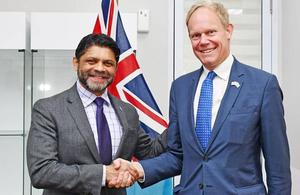£3.3 million boost for next generation nuclear technology
- Government’s nuclear ambitions backed with £3.3 million funding to support advanced nuclear technology
- projects across the UK will benefit, helping support research to develop a UK Advanced Modular Reactor (AMR)
- funding is a further boost for new homegrown nuclear to protect the UK’s energy independence
Cutting-edge nuclear technology projects across the UK have today (Friday 2 September) received government backing to help develop the next generation of nuclear reactors. The funding will support the early-stage innovation for 6 winning projects, helping attract private investment and supporting the creation of new, highly-skilled green jobs.
This £3.3 million funding through the Advanced Modular Reactor Research, Development and Demonstration (AMR RD&D) programme, will support the development of cutting-edge nuclear technology in the UK such as high temperature gas reactors (HTGRs), helping revolutionise the way the UK gets its energy.
The innovative projects being backed by the government include National Nuclear Laboratory Ltd in Cheshire, who are coordinating a UK-Japan team to design an innovative HTGR, and U-Battery Developments Ltd in Slough, for a study to determine the optimum size, type, cost, and delivery method for a U-Battery AMR suitable for demonstration in the UK.
The AMR funding represents another key step in the government’s plans to accelerate homegrown nuclear power to strengthen the UK’s energy security.
Energy Minister Greg Hands said:
This investment will help unlock the potential for new nuclear reactors in the UK, as we drive forward plans to boost clean, cutting-edge, homegrown technologies for our energy security, while driving down bills in the long term.
£2.5 million in funding is going to 6 projects seeking to develop Advanced Modular Reactors (AMRs) in the UK. These reactors use novel and innovative fuels, coolants, and technologies to generate high-temperature heat for industrial use, as well as electricity.
The AMR RD&D programme, part of the £385 million Advanced Nuclear Fund, focuses on developing high temperature gas reactors (HTGRs), with an ambition for a demonstrator by the early 2030s, as they optimise opportunities for decarbonising industrial heat to support the UK’s target of reaching net zero by 2050.
AMR technology could be a cost-effective solution for decarbonising industry, typically having higher temperature outputs than conventional reactors. The low carbon, high temperature heat from AMRs could be used for hydrogen production, process heat for industrial and domestic use, as well as electricity generation.
In addition, the government is providing up to £830,000 to the Office for Nuclear Regulation and the Environment Agency to develop their capability and consider innovative regulatory approaches to high temperature gas reactors (HTGRs). This will help support the government’s plans to have a UK-based HTGR demonstration by the early 2030s. BEIS will work with the Nuclear Decommissioning Authority and their wider estate to explore how to leverage their knowledge, sites and operational experience to inform the development, deployment and operation of the demonstration and to support BEIS policy objectives in this area.
The winners announced today
- U-Battery Developments Ltd in Slough is receiving £499,845 for a study to determine the optimum size, type, cost, and delivery method for an U-Battery AMR suitable for demonstration in the UK
- EDF Energy Nuclear Generation Ltd in Gloucester and Hartlepool is receiving £499,737 focusing on end-user requirements to determine the reactor design characteristics most suitable for a HTGR demonstration in the 2030s. EDF proposes the Hartlepool Heat Hub as a host site for the UK’s first HTGR demonstration
- Ultra Safe Nuclear Corporation UK Ltd in St Helens, Merseyside is receiving £498,312 for a project that will build on USNC’s existing micro modular reactor (MMR) design as a foundation to develop and demonstrate a modified MMR+ design best suited to UK industry’s current and projected future process heat demands. This includes a demonstration of hydrogen and sustainable aviation fuel (SAF) production
- National Nuclear Laboratory Ltd in Cheshire is receiving £497,495 for a project that coordinates a UK-Japan team (NNL, Japan Atomic Energy Agency (JAEA) and Jacobs) to leverage a proven HTGR baseline from Japan and adopt an innovative approach in its design, build, construction and operation
- Springfields Fuels Ltd in Salwick, Lancashire is receiving £243,311 for a project, in collaboration with Urenco Limited, to support the range of potential HTGR technologies which may come forward in the UK
- National Nuclear Laboratory Ltd in Cheshire is receiving £250,000 under the Lot 2 Phase A funding, for a project that aims to deliver a domestic commercial fuel supply starting with the first fuel load for the HTGR demonstration
Notes to editors
Funding for this programme was split into 2 Lots:
- Lot 1 for projects developing advanced modular HTGR technologies, with up to £500,000 available for each project
- Lot 2 for projects developing coated particle fuel (CPF) for HTGR technologies, with up to £250,000 available for each project

